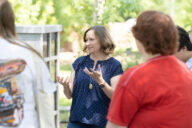Uncovering the truth and the trauma
When Dr. Marnie Watson’s career as a novelist didn’t pan out, she sought a new path where she would unveil truth about humanity and culture.
As a cultural and medical anthropologist, Watson immerses herself in her research, where she draws close to people in extreme circumstances. She asks questions to better understand, “how they deal with life in difficult situations.”
Much of her work has dealt with illicit drug use, mental health, poverty, homelessness and involuntary migration.
In 2022, she finally realized her dream of publishing a book – this time, about one of her research projects.

A moving career
Watson, now an assistant professor of anthropology at Missouri State University, characterizes her jump into this field as naïve.
“I was completely out of my depth,” Watson said.
It was fortunate, though, that as a graduate student, her advisors saw potential in her. Immediately, her research led her to meet individuals with behavioral health issues.
Those early studies showed her how meaningful the work was but also how emotionally taxing it would be.
“There were days I went home and I would tell my partner, ‘I made every single person I talked to today cry.’”
She also found that trauma serves as a common breeding ground for substance abuse.
“One hundred percent of the people I studied had suffered horrific trauma in their backgrounds,” she said. “That shifted my perspective on mental health and substance abuse.”
These experiences prepared her for a study with Nepali/Bhutanese refugees who were resettling in Akron, Ohio. This research is chronicled in her 2022 book with Dr. Pritha Gopalan, director of research and learning at Newark Trust for Education.
The head of social services at a local refugee resettlement agency, Radha Adkihari, reached out to the University of Akron, where Watson was teaching at the time. Adkihari asked for assistance in understanding one primary question: Why are there so many cases of alcoholism or alcohol-related injuries in the Nepali/Bhutanese refugee population?
“They said, ‘We’ve never seen anything like this. This group is off the charts,’” Watson said. “They were seeing advanced alcoholism in little old ladies, a lot of domestic violence, terrible car accidents and a lot of DUIs.”

Looking into the refugee experience
To prepare for this anthropological study, Watson first had to soak in the history of the Nepali/Bhutanese refugee camps established in the 1990s. At that time, many fled Bhutan due to an oppressive government. They sought asylum in Nepal.
“These people were in refugee camps for 20 years before they were resettled to the United States,” she said.
It’s not as simple as relocating families in the U.S., Watson noted. The government resettlement program doles out funds and assigns groups to settle in these designated locations, at times breaking up extended families in the process.
Watson advocates for preserving extended families in the resettlement process. Through intact kinship systems, refugees coordinate elder- and childcare, transportation and employment. These relationships also provide financial, psychological and emotional support, which are crucial for community and social integration.
To address the question of substance abuse, Watson enlisted the help of an interpreter – Santa Gajmere, who Watson called “a cultural broker” – to better communicate with these individuals.
The more they spoke with the people and learned about their heritage and situations, the more they realized the incredible diversity among the Nepali/Bhutanese refugees. This included multiple languages and dialects, religious differences, as well as caste and class differences.
“The resettlement program is causing a lot of trauma. Refugees have their original trauma from the events that led them to being refugees, and this whole set of traumas that came from living in the refugee camps. Then they were traumatized again when they were resettled to the U.S.”
Within those categories, there were different relationships with alcohol, too – some of which distinctly prohibited drinking.
A voice for the voiceless
While offering a resettlement program seemed like a humanitarian effort, Watson found parts of the program itself and the dispersal policy in particular problematic. Many individuals were isolated from their support systems, had difficulties integrating in the community and struggled to find meaningful work.
Ultimately, Watson discovered the program was part of the cause of the trauma that led to substance abuse issues.
“There are layers of trauma that accrued over time,” Watson said. “While you’d think that resettlement might be a purely positive experience, the way it is often done causes additional trauma. That is what people more often would talk about.”
Gopalan applauds Watson’s fieldwork, empathy and commitment to equity. The flaws in the system exposed in this study could easily be avoided, she noted, if people with direct experiences as refugees were included in the development of solutions.
“Their perspective is rich, layered and steeped in their experiences,” Gopalan said. “By employing strengths-based perspectives and discourse, we benefit from the refugees’ experiences and ideas, rather than patronizing them or casting them as helpless victims.”

Happiness in a small community
In Springfield, Missouri, Watson works with the previously unhomed at a tiny house community, Eden Village.
“Eden Village is built on the housing-first principle, which means, ‘Come with all your problems. You don’t have to sort anything out ahead of time,’” she said. “Once you’re housed, everything is easier.”
Watson is assessing whether residence at Eden Village improves quality of life.
More than that, though, she’s getting the insider view to understand the worldview of community members, which is what all true anthropologists do. She participates, observes and asks questions to get a deeper and more well-rounded perspective.
Telling the stories of the people she studies has fulfilled Watson’s purpose of uncovering universal truths – something she once thought possible through a career as a novelist.
“A little bit of anthropology is good for you,” she said, “because it is the ultimate study of how you are not the center of the universe.”
Further reading
- Story by Nicki Donnelson
- Photos by Jesse Scheve
- Video by Chris Nagle and Megan Swift

